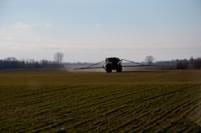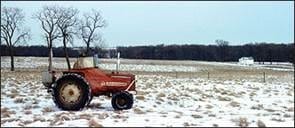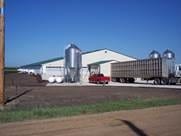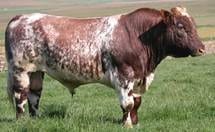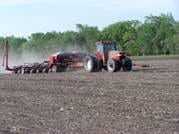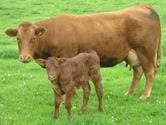Good evening,
This week brought some field activity as I noticed poultry manure being spread, lime being prepared for application, and wheat being top dressed. As field conditions improve, some may decide to begin spring activities such as these. When should manure be spread on a field? Also, when is it okay to apply lime and how much can be applied at a time? When should nitrogen be applied to wheat? It is recommended that manure should not be applied when there exists a chance for run-off. Manure should be incorporated when possible, and not over-applied. For more information, OSU has put together ‘Best Management Practices: Land Application of Animal Manure’ which can be found at http://ohioline.osu.edu/agf-fact/0208.html. See the article below about Pelletized Lime that has a link to an OSU Fact Sheet on lime application and the article on Nitrogen Recommendations for Wheat. There is also some tile installation being done in the area, as I saw both some trenching and V-plow operations being done.
This summer we plan to continue the soybean research that was started last year in Hardin County. This research involves identifying yield-limiting factors in soybean production and the goal is to increase production. I am currently looking for 2-3 farmers who would like to be a part of this study. We are looking for fields at least 40 acres in size that will be planted to soybeans this spring. The farmer is asked to complete a management practices survey. I will come out and do soil sampling for nutrients and soybean cyst nematodes as part of the study. Later, I will take some leaf samples for nutrient analysis and scout the field for insects, weeds, and diseases two different times. Once the soybeans are harvested, we will ask for yield data from your combine monitor and a sample of grain will be sent to OSU for analysis. Each process will be conducted in three separate areas of the field. There is a $200 stipend paid to the cooperating farmer for participating in the study. In the end, information will be shared with the farmer to potentially help increase production. If you are willing to participate in this project, please let me know so that I can line up the materials and supplies by April 7.
Last week I told you about the honor the Sieg Dairy Farm received at the Dairy Farmers of America conference. This week I have attached an article from their publication that tells you more about the Member of Distinction that this local dairy operated by Amanda and Nate Cromer received. Each year at DFA’s Annual Meeting in Kansas City, Missouri, the co-op recognizes seven (one representing each of the 7 area councils) member families from across the U.S. that were selected by the farmer council members in their respective area, from a large group of nominees each year. The Member of Distinction program recognizes members who excel on their operations, in their communities and in the industry. They inspire others through their actions, leadership and involvement and embody the Cooperative’s core values. Look for a news article soon. The Mideast Area Council of Dairy Farmers of America was very proud to have the Cromer Family be able to attend the Annual Meeting and accept this honor last week in front of hundreds of fellow dairy producers and industry leaders from across the nation.
While I am talking about dairy, don’t forget that the Diary Service Unit Spring Cheese Sale orders are due Monday, March 31. I have attached another copy of the order form if you need one. Also, I have attached a news release about the new Diary Feeder show at the Ohio State Fair. Meetings this week include a rescheduled Master Gardener program on honeybees at the Mary Lou Johnson Library in Kenton. This program will be Wednesday, April 2 at 6:30 pm and will feature Master Gardener Volunteer Barb Snyder. The same evening will be an Extension Advisory Committee meeting at the courthouse, starting at 7:00 pm. Ag Council will be meeting Friday, April 4 starting at 7:00 am with a breakfast buffet. The meeting will feature a policy development program by the Farm Bureau and will be held at Henry’s Restaurant in Kenton. The Fairboard will be holding their monthly meeting Saturday, April 5 at the fair office starting at 7:30 pm.
Mark
Weather Outlook – Jim Noel
For the remainder of March temperatures may range 5-10 degrees below normal with about normal rainfall. The outlook for the first week of April calls for temperatures a few degrees above normal and normal rainfall. The outlook for the remainder of April then switches back to slightly colder than normal temperatures (-1F to -3F) and slightly wetter than normal weather. Normal April highs are mainly in the 50 degree range and lows in the 30-35 degree range. Normal rainfall is about 0.75 to 1.00 inches per week now. It still looks like based on historical data that the last freeze could be 1-2 weeks late this spring. Years like this one would include the 1963, 1979 and 1994 spring seasons. Also, looking at those years, hail activity was increased with cold air aloft.
Pelletized Lime in Production Systems – Ed Lentz
Pelletized lime has been on the market for over ten years in Ohio. It consists of finely ground limestone held together by some form of binding agent to make a pellet. Since it requires more processing than traditional ag lime it often costs considerably more than bulk ag lime. However, since it is in a pellet form it can easily be blended with other fertilizers and applied with regular dry fertilizer equipment. University research has shown that pelletized lime does not raise soil pH faster than high quality ag lime. This should not be a surprise since high quality ag lime includes a large portion of material this has been finely ground. To continue reading this article, go to http://corn.osu.edu/newsletters/2014/2014-7/pelletized-lime-in-production-systems.
Nitrogen Recommendations for Wheat – Ed Lentz, Laura Lindsey
Soon wheat will be greening-up across the state. Ohio State University recommends applying nitrogen between green-up and Feekes Growth Stage 6 (early stem elongation), which is generally the latter part of April. The potential for nitrogen loss will decrease by waiting to apply closer to Feekes 6. Greenup will be later this year and a common sense approach would recommend applying as soon as field conditions allow application equipment, particularly since days available for field activities may be limited between now and Feekes 6. To read more wheat nitrogen recommendations, go to http://corn.osu.edu/newsletters/2014/2014-7/nitrogen-recommendations-for-wheat.
2014 Farm Bill Meeting in Darke County Was a Big Success, Get Your DVD Now – Sam Custer
A standing room only crowd of more than 400 people attended the 2014 Farm Bill meeting at Versailles Schools. Attendees came from across Ohio and Indiana to hear from experts about how the bill will affect them.
Partners in sponsoring and hosting the meeting were: OSU Extension, Darke County; Farm Credit of Mid America; Ohio Ag Net – Ohio’s Country Journal; Versailles Ag Ed and FFA; USDA Farm Service Agency, Darke County; Ohio and Darke County Farm Bureau; and QBE NAU Crop Insurance. See the attached article for more information about the event opportunity to order a DVD.
Darke County Extension News Release
Mercer County Ag Day – April 15 – Mercer County Fairgrounds. Celina – Doors open at 7:00 am
Start the day off with an Ag Day Breakfast at 7:30 am, then check out the displays, vendors, and more. OSU Extension Educator David Marrison is presenting a program called “Passing On the Farm.” Greg Peterson from Peterson Farm Brothers who has been all over social media will be the guest speaker. This event is open to the public and costs $10. Call ahead to RSVP at 419-586-3239 by April 4. See the attached flier for more information.
Mark A. Badertscher
Agriculture and Natural Resources Educator
OSU Extension Hardin County
1021 W. Lima Street, Suite 103, Kenton, OH 43326
419-674-2297 Office


